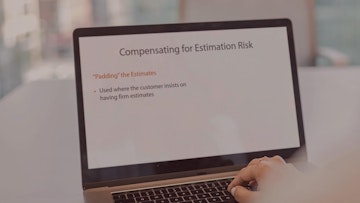
An Agile project is a very different environment from a traditional, plan-driven project and requires a fundamentally different approach for estimation, metrics, and risk management. In this course, you will learn about estimation approaches and best practices in an Agile environment, how to identify, analyze, respond, and monitor and control risk in an Agile project, and lastly how metrics are used in an Agile environment. When you are finished with this course, you will have a foundational knowledge of Agile estimation, metrics, and risk management that will help you move forward to becoming an Agile Project Manager. This course...
Read more
Good to know
Save this course
Activities
Career center
Scrum Master
Product Owner
Agile Coach
Project Manager
Risk Manager
Business Analyst
Software Engineer
Data Analyst
Quality Assurance Analyst
Portfolio Manager
Program Manager
Consultant
Change Manager
Entrepreneur
Freelance Writer
Reading list
Share
Similar courses
OpenCourser helps millions of learners each year. People visit us to learn workspace skills, ace their exams, and nurture their curiosity.
Our extensive catalog contains over 50,000 courses and twice as many books. Browse by search, by topic, or even by career interests. We'll match you to the right resources quickly.
Find this site helpful? Tell a friend about us.
We're supported by our community of learners. When you purchase or subscribe to courses and programs or purchase books, we may earn a commission from our partners.
Your purchases help us maintain our catalog and keep our servers humming without ads.
Thank you for supporting OpenCourser.


